

Is the staggeringly profitable business of scientific publishing bad for science? N 2011, Claudio Aspesi, a senior investment analyst at Bernstein Research in London, made a bet that the dominant firm in one of the most lucrative industries in the world was headed for a crash.

Reed-Elsevier, a multinational publishing giant with annual revenues exceeding £6bn, was an investor’s darling. It was one of the few publishers that had successfully managed the transition to the internet, and a recent company report was predicting yet another year of growth. Aspesi, though, had reason to believe that that prediction – along with those of every other major financial analyst – was wrong. The core of Elsevier’s operation is in scientific journals, the weekly or monthly publications in which scientists share their results.
Despite the narrow audience, scientific publishing is a remarkably big business. But Elsevier’s business model seemed a truly puzzling thing. Scientists are well aware that they seem to be getting a bad deal. NZJE Reviewer Mentoring Scheme. Fostering the next generation of reviewers in New Zealand ecology Recently, the New Zealand Journal of Ecology announced a trial of a mentoring scheme for new reviewers (Curran et al. 2013), based on others suggested elsewhere (MFR 2008, Donaldson et al. 2010; Zimmerman et al. 2011).
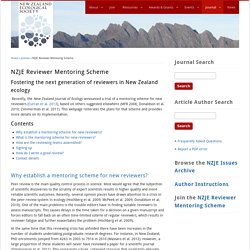
If we want to improve peer review, we'll need to invest in training. You’ve just accepted your first invitation to peer review a journal article.

The paper is the culmination of years of the author’s research and its publication is an important next step. You want to get it right; give constructive feedback, check whether it works for the journal, and generally improve the quality of the article. Six month friday night curry subscription by the spicery. Made in Britain can be personalised The Friday Night Curry Discoverer subscription contains all the fresh spices and recipes you need to make a fantastic curry spread every month.
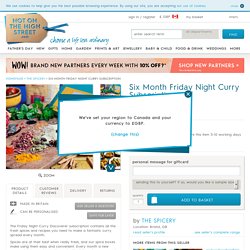
Spices are at their best when really fresh, and our spice boxes make using them easy and convenient. NeuroChambers: The things you hate most about submitting manuscripts. A few days ago I asked the twittersphere what rubs people the wrong way when it comes to submitting manuscripts to peer reviewed academic journals.
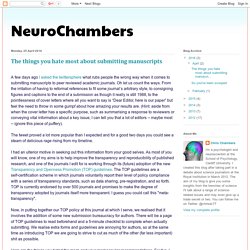
Oh let us count the ways. From the irritation of having to reformat references to fit some journal’s arbitrary style, to consigning figures and captions to the end of a submission as though it really is still 1988, to the pointlessness of cover letters where all you want to say is “Dear Editor, here is our paper” but feel the need to throw in some gumpf about how amazing your results are. (Hint: aside from when the cover letter has a specific purpose, such as summarising a response to reviewers or conveying vital information about a key issue, I can tell you that a lot of editors -- maybe most -- ignore this piece of puffery). The tweet proved a lot more popular than I expected and for a good two days you could see a steam of delicious rage rising from my timeline. The author’s side of peer review. It’s not a vote: How editors use peer reviews. Picture this.
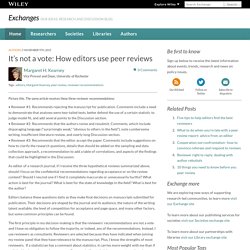
The same article receives these three reviewer recommendations: • Reviewer #1: Recommends rejecting the manuscript for publication. Comments include a need to demonstrate that analyses were two-tailed tests, better defend the use of a certain statistic to judge model fit, and add several points to the Discussion section. • Reviewer #2: Recommends that the authors revise and resubmit.
Comments, which include disparaging language (“surprisingly weak,” “obvious to others in the field”), note cumbersome writing, insufficient literature review, and overly long Discussion section. • Reviewer #3: Recommends that the editor accept the paper. Why You Gotta Be So Mean? - Do Your Job Better. This summer I took my 11-year-old daughter and her friend to a Taylor Swift concert.
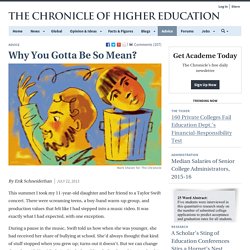
There were screaming teens, a boy-band warm-up group, and production values that felt like I had stepped into a music video. Delicious. How to get published in an academic journal: top tips from editors. Writing for academic journals is highly competitive.

What I wish i'd known. February 11, 2015 | Professor Elliot Shubert Editor-in-Chief, Systematics and Biodiversity What I wish I’d known when I first started editing a journal How teamwork and an online submission system helped one editor Taking over a journal can be challenging but there are saving factors, including online submission systems.
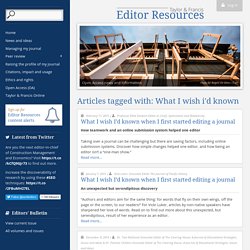
Discover how simple changes helped one editor, and how being an editor isn’t a “one-man show.” Read more... January 7, 2015 | Vicki Luker, Executive Editor The Journal of Pacific History What I wish I’d known when I first started editing a journal. 7 Crazy Realities of Scientific Publishing. August 13, 2015 A couple of months ago, we wrote an article for Cracked.com highlighting how academic publishing companies have hurt the progress of Science.
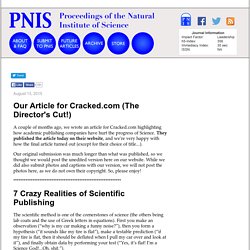
They published the article today on their website, and we're very happy with how the final article turned out (except for their choice of title...). Our original submission was much longer than what was published, so we thought we would post the unedited version here on our website.